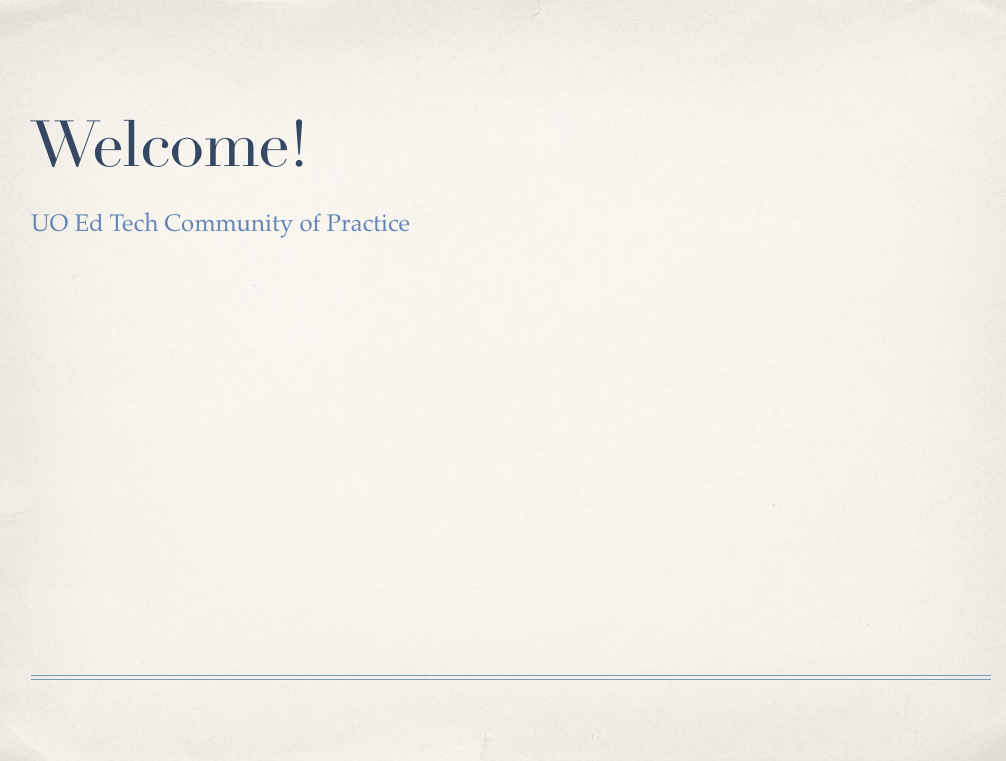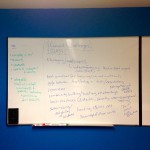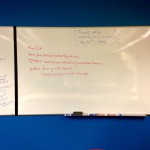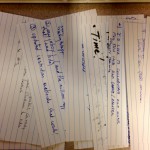Attendees
- Tom Lundberg
- Ramiro Vasquez
- Edward Mason
- Amy Keene
- Tyler Brandt
- Michele Reniff
- Karen Matson
- Scott Huette
- Helen Chu
- Katy Lenn
- Ken Loge
- Stan Hall
- Pat Fellows
- Matt Schmidt
- James Bailey
- Doug Blandy
- Candice Kramer
- Skipper McFarlane
- Sean Sharp
- Mary Popish
- Karl Owens
- Robert Voelker-Morris
- Shandon Bates
- Stefanie Dupray
- Mike Moresi
Discussion items
Individual Introductions and Lunch: Everyone
Introduction to the UO Ed-Tech Community of Practice Mission and Goals: Sean Sharp and Robert Voelker-Morris
Group Activity: Facilitated by Pat Fellows and Karen Matson
What do you want from this group?
How often should we meet?
Topics brought up by groups:
- Specific “specialized” topic groups: These groups would focus on specific topics, for example classroom technology support, and meet outside the main CoP meeting times. These groups could then report back to the larger CoP group with their findings and recommendations. These special topic groups also could facilitate focus groups, such as with faculty about their classroom technology needs.
- Need a centralized service catalog: How could CoP help facilitate this centralized catalog of Ed-Tech services on campus? Should this be part of the CoP’s charge? Who has time to manage this?
- CoP larger group meetings should happen at least once a term, but overall still not decided if more meetings are feasible. Many, in all of the groups, would like to meet more often with their colleagues and peers from around campus, but there is still that challenge of complex schedules for such a large group [Update: The core planning group has decided to work with every third week (Week 3) of the term as the consistent larger group initial meeting time for every term, including summer.]
- How to really maximize the CoP as a group to share resources was a key concern. But again how to make this work with each member’s very full support schedules and within the priority work mandated by their contracted job descriptions? Where might the CoP blog come into this structure, how might the blog site help out? Again who manages this all?
Homework!
Each member was sent an email with the following “homework” assignment:
As part of the process for building and growing this CoP group here is your homework: Please send to me (via this email is fine) the following information for our CoP blog site (https://blogs.uoregon.edu/edtechcommunity/):
1. Name, title, department/program
2. Brief bio (three to four sentences, see our current examples here: https://blogs.uoregon.edu/edtechcommunity/bios-of-members/)
3. Four to six areas of interest. As in let’s start to build a folksonomy of interest areas for everyone that we can tap into for thinking about creating our “Special Interest Groups” and also to assist in our networking with each other across campus. Keep these short and at a keyword tag level. For example: “online education” “classroom technology” “help desk support” “professional development” “centralized service catalog” and so on.
4. A photo of yourself!
Additional Resources
NW eLearn: http://nwelearn.org/conference/ and http://nwelearn.org/conference/registration/
NWACC (NW Academic Computing Consortium): http://www.nwacc.org/programs/conf16/overview.html and if you are interested in this one please contact Helen Chu helenc@uoregon.edu



